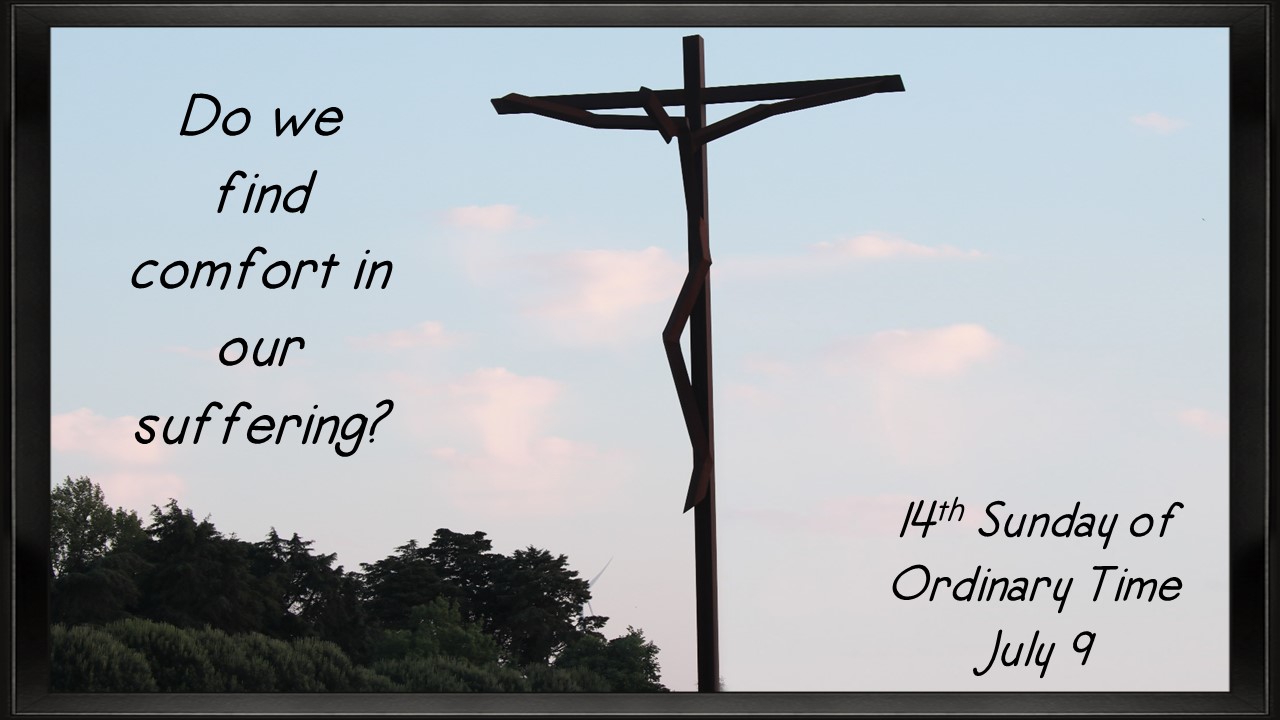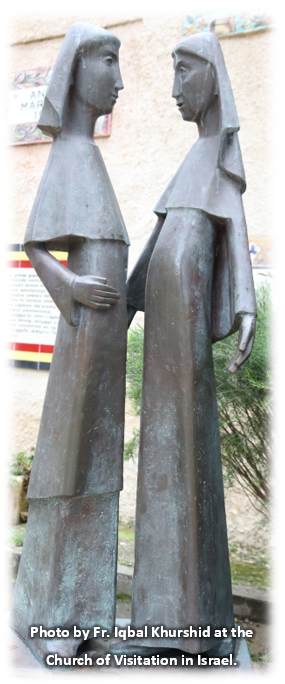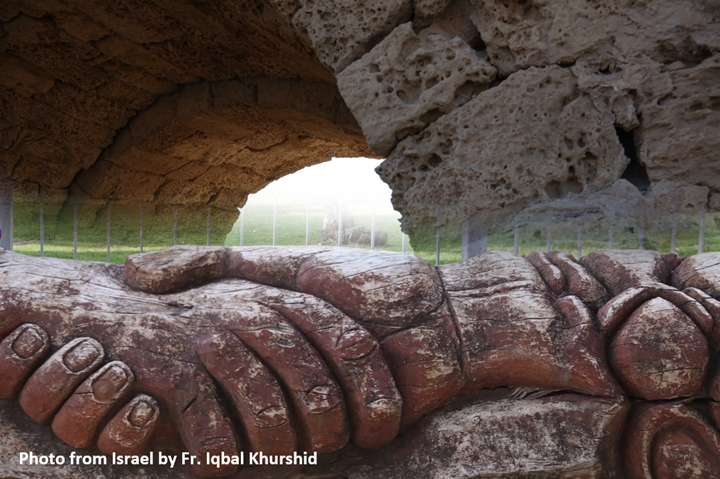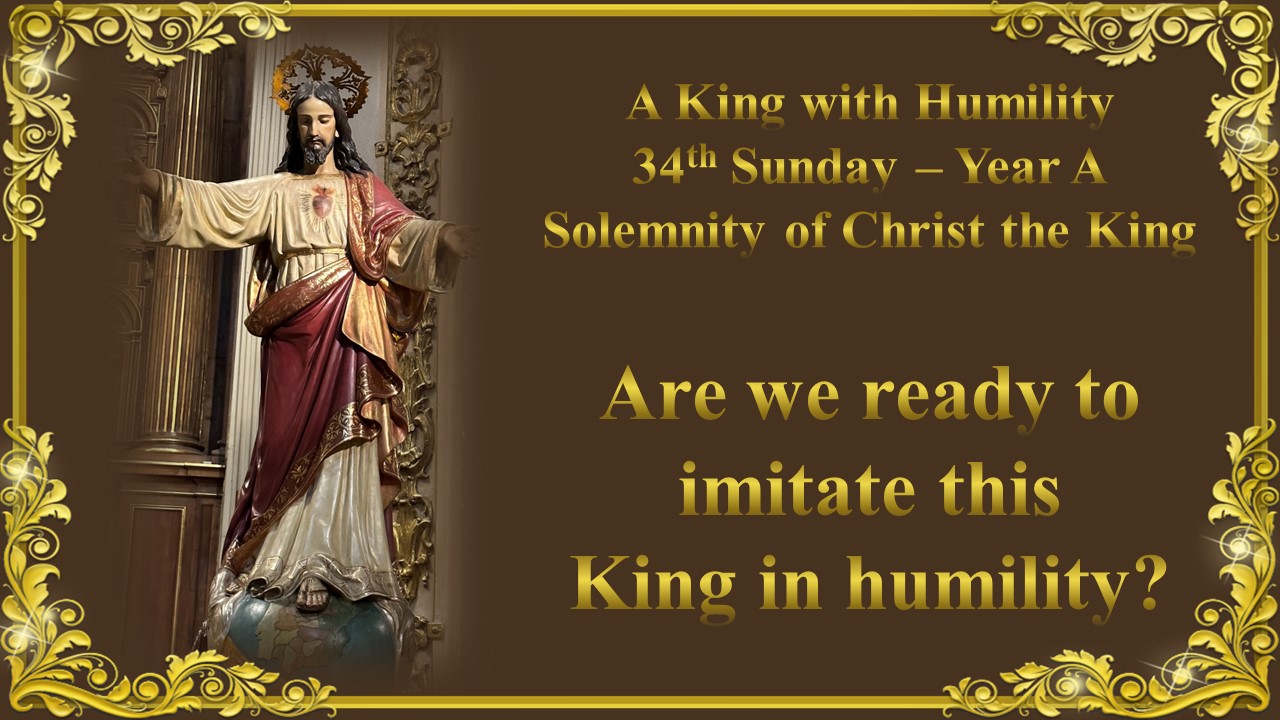
14th Sunday in Ordinary Time Year A ~ July 9, 2023
HIS INVITATION & COMFORT
St. Teresa of Avila believed that if we work hard we can achieve perfection and that perfection can lead us to the Lord who not only invites us but also comforts in our suffering. “When asking a favor of a person of importance would anyone be so ill-mannered and thoughtless as not first to consider how best to address him in order to make a good impression and give him no cause for offense? Surely, he would think over his petition carefully and his reason for making it, especially if it were for something specific and important as our good Jesus tells us our petitions should be. It seems to me that this point deserves serious attention. My Lord, could you not have included all in one word by saying “Father, give us whatever is good for us?” After all, to one who understands everything so perfectly, what need is there to say more? O Eternal Wisdom, between you and your Father that was enough; that was how you prayed in the garden. You expressed your desire and fear but surrendered yourself to his will. But as for us, my Lord, you know that we are less submissive to the will of your Father and need to mention each thing separately in order to stop and think whether it would be good for us, and otherwise not ask for it. You see, the gift our Lord intends for us may be by far the best, but if it is not what we wanted we are quite capable of flinging it back in his face. That is the kind of people we are; ready cash is the only wealth we understand.
Therefore, our good Jesus bids us to repeat these words, this prayer for his kingdom to come in us: Hallowed be your name, your kingdom come. See how wise our Master is! But what do we mean when we pray for this kingdom? That is what I am going to consider now, for it is important that we should understand it. Our good Jesus placed these two petitions side by side because he realized that in our inadequacy we could never fittingly hallow, praise, exalt or glorify this holy name of the eternal Father unless he enabled us to do so by giving us his kingdom here on earth. But since we must know what we are asking for and how important it is to pray for it without ceasing and to do everything in our power to please him who is to give it to us, I should now like to give you my own thoughts on the matter. Of the many joys that are found in the kingdom of heaven, the greatest seems to me to be the sense of tranquility and well-being that we shall experience when we are free from all concern for earthly things. Glad because others are glad and for ever at peace, we shall have the deep satisfaction of seeing that by all creatures the Lord is honored and praised, and his name blessed. No one ever offends him, for there everyone loves him. Loving him is the soul’s one concern. Indeed, it cannot help but love him, for it knows him. Here below our love must necessarily fall short of that perfection and constancy, but even so how different it would be, how much more like that of heaven, if we really knew our Lord!”
We have been reflecting for the last few weeks on the Gospel of St. Matthew. On the 11th Sunday we reflected on the compassion of Jesus which he showed towards the crowd without the shepherd and gave authority to his twelve chosen apostles to heal the sick, raise the dead and cast out the demons. And on 12th Sunday Lord encouraged everyone “have no fear” to anyone but trust in God the Father who has control of everything. Last Sunday we were able to understand and recognize our discipleship to follow him without any partiality.
Once a man who was full of fear and sadness, met with God and pleaded him to take every fear and sadness away from him.
God gave him two boxes to chose whatever he wishes to have.
The man shared his experience with following words:
I have in my hands two boxes, Which God gave me to hold.
He said, “Put all your sorrows in the black box, And all your joys into the gold.”
I heeded His words, and in the two boxes both my joys and sorrows I stored, but though the gold became heavier each day, the black was as light as before.
With curiosity, I opened the black. I wanted to find out why,
and I saw, in the base of the box, a hole which my sorrows had fallen out by.
I showed the hole to God and mused, “I wonder where my sorrows could be?”
He smiled a gentle smile and said, “My child, they’re here with me.”
I asked God why He gave me the boxes, Why the gold and the black with the hole?
“My child, the gold is for you to count your blessings. The black is for you to let go.”
The Scripture Readings for this Sunday reveal the same message to us. In the First Reading Prophet Zachariah brings the message of hope and comfort to the house of Israel by saying “Thus says the Lord: Rejoice greatly, O daughter Zion…”. We all Prophet Zachariah reveals that God loves everyone and he is there to protect and comfort everyone. Prophet Isaiah says “Comfort, O comfort my people, says your God. Speak tenderly to Jerusalem, and cry to her that she has served her term, that her penalty is paid, that she has received from the Lord’s hand double for all her sins”. Even in the Book of Exodus God comes down to save and comfort “I have heard the misery of my people and I have come down to save them…”. In our day to day life, we all have pain, sufferings, fear, stress, depression, and loneliness but we all know anything remains forever because God comforts us. Someone wrote the following poem…
An Angel’s Hand
An angel whispered in my ear…
“Believe in me and have no fear, come with me and take my hand,
I will take you to another land.
A place of peace, a place of light, don’t be afraid, just hold on tight.
Your earth days are done but don’t be sad remember all the times you had;
Loved ones will join you, don’t despair, you have many in Heaven waiting there.
Your body dies, your soul is free, that’s why you get to fly with me.
The servant songs of Prophet Isaiah (50-53) reveal the true divinity of our Savior who is being led like a lamb for slaughtering. He is being mocked, flogged, spitted and crucified but he was silent because “he carried our iniquities and infirmities on to him”. He cares for us as St. Peter says and cannot deny himself as St. Paul adds.
In the Gospel today, we find the same comforting message. In the first place, Jesus praises the Father, because He has kept the secrets of His Kingdom, of His truth, hidden from “from the wise and the learned”. He calls them so with a veil of irony because they presume to be wise, learned, and therefore have a closed heart, very often. True wisdom comes also from the heart, it is not only a matter of understanding ideas: true wisdom also enters into the heart. And if you know many things but have a closed heart, you are not wise. Jesus says that the mysteries of His Father are revealed to the “little ones”, to those who confidently open themselves to His Word of salvation, who open their heart to the Word of salvation, who feel the need for Him and expect everything from Him. The heart that is open and trustful towards the Lord. Then, Jesus explains that He has received everything from the Father, and He calls Him “my Father”, to affirm the unique nature of His relationship with Him. Indeed, there is total reciprocity only between the Son and the Father: each one knows the other, each one lives in the other. But this unique communion is like a flower that unfurls, to reveal freely its beauty and its goodness. And here, then, is Jesus’s invitation: “Come to me…”. He wishes to give what He receives from the Father. He wants to give us the Truth, and Jesus’ Truth is always free: it is a gift, it is the Holy Spirit, the Truth.
Just as the Father prefers the “little ones”, Jesus also addresses those “who labour and are burdened”. Indeed, He places Himself among them, because He is “meek and humble of heart”: this is how He describes Himself. It is the same in the first and third Beatitudes, that of the humble and poor in spirit, and that of the meek (see Mt 5:35): the meekness of Jesus. In this way Jesus, “meek and humble”, is not a model for the resigned, nor is He simply a victim, but rather He is the man who lives this condition “from the heart” in full transparency to the love of the Father, that is, to the Holy Spirit. He is the model of the “poor in spirit” and of all the other “blessed” of the Gospel, who do the will of God and bear witness to His Kingdom.
The following poem will help us to understand “Why Jesus is so important for us?”:
Before U were thought of or time had begun, God had stuck U in the name of His Son. And each time U pray, you’ll see it’s true, you can’t spell out JesUs and not include U. You’re a pretty big part of His wonderful name, For U, he was born; that’s why He came. And His great love for U is the reason that he died, It even takes U to spell crUcified. Isn’t it thrilling and splendidly grand, He rose from the dead with U in His plan. The stones split away, the gold trUmpet blew, and this word ressUrection is spelled with a U. When Jesus left the earth at His upward ascension, He felt there was one thing He just had to mention. “Go into the world and tell them it’s true, That I love them all-Just like I love U. So many great people are spelled with a U, don’t they have the right to know JesUs too? It all depends now on what U will do, He’d like them to know, but it all starts with U. Will U pass it on? JesUs Loves U!!!
To comfort the suffering humanity, God loved the world so much that he gave his only Begotten Son, so that anyone who believes in him, may have life and life and in abundance. Jesus through St. John say, “don’t let your hearts be troubled, believe in God and believe also in me”. In the last part of the Gospel, Jesus invites everyone to himself “Come to me all that are weary and are carrying heavy burden”. Why does Jesus invite everyone to himself whereas he has the power to take away the pain and suffering of other? First Jesus wants people to understand that in their suffering, they are not alone but he is with them. Secondly promises that he is going to give us rest. In other words, he is going to give us comfort and peace. Thirdly Jesus is asking everyone to take his yoke which is, love to learn how to become humble. As St. Paul says, “he became obedient to the death, even death on the Cross”. Lastly Jesus asks all his followers to imitate him in humility, sacrifice, and love “For my yoke is easy, and my burden is light”.
Jesus says that if we go to Him, we will find refreshment. The “refreshment” that Christ offers to the weary and oppressed is not merely psychological solace or a lavish handout, but the joy of the poor who are evangelised and are builders of the new humanity: this is solace. Joy. The joy that Jesus gives us. It is unique. It is the joy that He Himself has. It is a message for all of us, for all people of good will, which Jesus still conveys today in the world that exalts those who become rich and powerful … But how many times do we say, “Ah, I would like to be like him, like her, who are rich, have a lot of power, lack nothing…”. The world exalts those who are rich and powerful, no matter by what means, and at times tramples upon the human being and his or her dignity. And we see this every day, the poor who are trampled underfoot… And it is a message for the Church, called to live works of mercy and to evangelise the poor, to be meek and humble. This is how the Lord wants His Church, that is, us, to be.
The yoke of Christ is not really a yoke but a bond of love, which joins us to Him, and through Him, to our loving Father in heaven. The rule of life which He asks us to keep, if we are loyal followers of His, is not a series of prohibitions and don’ts. It is rather a succession of signposts on the straight road to heaven, making our journey easier and safer. He does ask us to carry our cross daily, that is, to bear the burden of each day’s duty, but once the cross is grasped firmly and lovingly it ceases to be a burden. Surely God is good to us, to put us into this world at this day and age, and give us the light of faith, and the knowledge of God and of His loving plans for us, which make the burdens of this life so relatively light and even so reasonable for us. We still have to earn our bread. We still have sickness and pains. We still have death stalking the earth, but unlike the people before Christ we now see a meaning to all these trials.
I agree with the words of St. Jerome that should enter into his dwelling place because there is eternal life and redemption of all suffering. “As the deer longs for running water, so my soul longs for you, my God. Just as the deer longs for running water, so do our newly baptized members, our young deer, so to speak, also yearn for God. By leaving Egypt and the world, they have put Pharaoh and his entire army to death in the waters of baptism. After slaying the devil, their hearts long for the springs of running water in the Church. These springs are the Father, the Son and the Holy Spirit. Jeremiah testifies that the Father is like a fountain when he says: They have forsaken me, the fountain of living water, to dig for themselves cisterns, broken cisterns that can hold no water. In another passage we read about the Son: They have forsaken the fountain of wisdom. And again, John says of the Holy Spirit: Whoever drinks the water I will give him, that water shall become in him a fountain of water, springing up into eternal life. The evangelist explains that the Savior said this of the Holy Spirit. The testimony of these texts establishes beyond doubt the three fountains of the Church constitute the mystery of the Trinity. These are the waters that the heart of the believer longs for, these are the waters that the heart of the newly baptized yearns for when he says: My heart thirsts for God, the living fountain. This is not a weak, faint desire to see God; rather the newly baptized actually burn with desire and thirst for God. Before they received baptism, they used to ask one another: When shall I go and see the face of God? Now their quest has been answered. They have come forward and they stand in the presence of God. They have come before the altar and have looked upon the mystery of the Savior. Having received the body of Christ, and being reborn in the life-giving waters, they speak up boldly and say: I shall go into God’s marvelous dwelling place, his house. The house of God is the Church, his marvelous dwelling place, filled with joyful voices giving thanks, and praise, filled with all the sounds of festive celebration”.
We all want to have worry & pain free life but “life is the bed of roses” but there is suffering, brokenness and sadness. However, we must “do not seek to have these trials lifted from you, instead, ask for the grace to bear them well”. St. Bernadette who saw Blessed Virgin Mary, she suffered with her sickness when she was asked that how come people are getting healed from the water of the fountain and nothing is happening to you, why and her answer was “God wants me to suffer so that I can rejoice in heaven”.
Today the Lord is inviting us to come to him and he will give us rest from our pain and suffering. Remember he is our trouble tree who could take all our pain and suffering onto him…
She hired a plumber to help her restore an old farmhouse, and he had just finished a rough first day on the job: a flat tire made him lose an hour of work, his electric drill quit, and his ancient one-ton truck refused to start. While she drove him home, he sat in stony silence. On arriving, he invited her in to meet his family. As they walked toward the front door, he paused briefly at a small tree, touching the tips of the branches with both hands. When opening the door, he underwent an amazing transformation. His tanned face was wreathed in smiles, and he hugged his two small children and gave his wife a kiss.
Afterward, he walked back to the car. They passed the tree, and her curiosity got the better of her. She asked him about what she had seen him do earlier. “Oh, that’s my trouble tree,” he replied. “I know I can’t help having troubles on the job, but one thing’s for sure; those troubles don’t belong in the house with my wife and the children. So, I just hang them up on the tree every night when I come home and ask God to take care of them. Then in the morning, I pick them up again. Funny thing is,” he smiled, “when I come out in the morning to pick ’em up, there aren’t nearly as many as I remember hanging up the night before.”
Do we find comfort in our suffering?
Let’s pray for everyone who is suffering and finding life burdensome, that they may be comforted by the Lord who will wipe tears from every eye. May this week bring many blessings for everyone and especially for those who are grieving. Amen
Other Sermons In This Series

BRINGING JESUS TO OTHER | December 19, 2021 – 4th Sunday of Advent
December 17, 2021

3rd Sunday of Lent – Year C – March 20, 2022
March 18, 2022

34th Sunday-Solemnity of Christ the King- Year A ~ November 26, 2023
November 24, 2023

